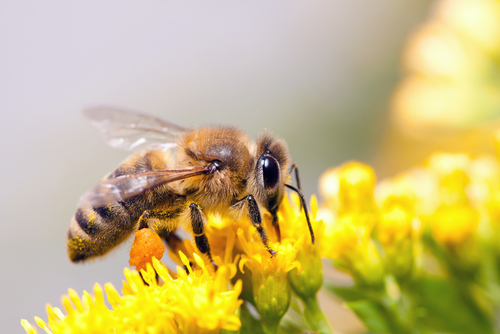
Can local honey help pollen allergies?
As an allergist, I am often asked if local honey can be an all-natural remedy for seasonal allergies. It is very difficult to break people’s myth that local honey will not desensitize them from the pollen causing their allergic symptoms. The basic principle, as understood by folks who believe in honey curing their allergic symptoms, is that honey from local bee hives contains pollen. Pollen is responsible for initiating the immune response causing allergic symptoms. People believe that a daily dose of pollen can help their body develop tolerance to pollen and hence, be a natural cure for allergic and asthma symptoms. It is disheartening to say, but this logic is absolutely incorrect.
It is true that all seasonal allergies are caused by tree, grass and weed pollen. These pollen have to be small and windborne to be able to get inside the nasal passages to initiate the immune cascade causing the runny nose, watery eyes, and itchiness. It is also true that the same pollen, that causes allergic symptoms, can gets stuck to the legs or body of bees in the process of making honey and pollinating one plant to another. However, the amount of pollen in honey is minute around 0.1 to 0.4 percent (as per National Honey Board). This amount is definitely not enough to desensitize sensitive individuals from their allergic symptoms.
Another reason why honey may not be effective for it possibly carries a pollen that may not be responsible for your symptoms. The pollen has to be light and windborne to cause symptoms. A typical flower pollen is too big in size to actually cause allergic phenomenon. Also, with honey, regulating the dose of the pollen is not possible. This is another reason why local honey will not cure allergy symptoms. Of course, it cannot be denied that regular daily use of honey can increase weight because of its carbohydrate content. The concept of allergy shots/immunotherapy is similar to provide an “all-natural” cure to allergies. Allergy shots contain a mixture of trees, grasses and weeds that are standardized and prepared in a dedicated lab.
The individual preparation prescription is written by a board certified allergist. It is given in a strength which causes desensitization to the outdoor and indoor environmental allergens, thereby, reducing the need for medications. Apart from allergy injections, oral immunotherapy for grass and ragweed has been approved by FDA recently. However, it is important that a board certified allergist makes the decision of immunotherapy for the correct dose of pollen in a correct patient is the key to success of allergy injections or immunotherapy. For any comments or questions, please do not hesitate to write to us on info@theallergygroup.com or call 208 377 4000.

